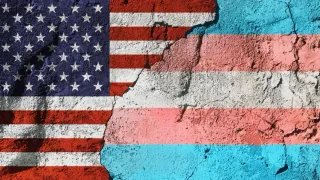
4 hours ago
Transgender Teen’s Gender-Affirming Care Halted by Hospital Policy Shift Ahead of College
READ TIME: 3 MIN.
Lee, a 17-year-old from Pittsburgh, had planned his early high school graduation around one purpose: accessing gender-affirming surgery and completing his transition before starting college. For two years, Lee had relied on UPMC’s gender-affirming care program, working with doctors and counselors to align his body with his identity. In June, as he prepared for his first semester at Carlow University, those plans were upended .
On June 30, 2025, UPMC, one of Pennsylvania’s largest health systems, abruptly ended gender-affirming care for patients under 19. Lee’s final puberty blocker shot was delayed by a pharmacy error, and the “weaning off” process his doctor promised never materialized. “You feel like you’re starting from rock bottom,” Lee told reporters, describing hot flashes and the sudden loss of care as he faced an uncertain medical future .
UPMC’s decision was not an isolated act of policy but a direct response to a January 2025 executive order from President Donald Trump. The order barred the use of federal funds for gender-affirming care—including hormone therapy, puberty blockers, and surgeries—for transgender patients under age 19 . Though the order falls short of a legal mandate, its financial implications are significant. Hospitals and health systems, already under pressure, perceive ongoing services as a risk to vital federal funding .
A spokesperson for UPMC acknowledged the gravity of the situation, stating that the Trump administration had made it “abundantly clear” that continuing to provide certain types of gender-affirming care to minors could put providers “at risk of criminal prosecution” as well as loss of funding . The policy change at UPMC mirrors actions by other major health systems across the United States, including Penn Medicine and Children’s Hospital Los Angeles, who have similarly suspended services under threat of federal penalties .
The abrupt withdrawal of care, although not required by Pennsylvania law, has triggered legal and political backlash. Seventeen Democratic officials, including Pennsylvania Governor Josh Shapiro, have filed suit against the Trump administration, arguing that the executive order constitutes federal overreach and threatens the health and autonomy of transgender youth . Critics point out that gender-affirming care remains legal in Pennsylvania and that the executive order’s primary effect has been to generate confusion and fear among providers and patients alike .
National medical organizations, including the American Academy of Pediatrics and the American Medical Association, maintain that gender-affirming care is essential, evidence-based, and often lifesaving for transgender minors. They warn that abrupt discontinuation can lead to severe mental health challenges and increased risk of self-harm . For Lee, the consequences are immediate and personal, as the loss of care has meant a return of unwanted physical symptoms and a halt to his carefully laid plans.
UPMC’s decision reflects a growing trend seen nationwide, as hospitals grapple with unclear federal directives and the threat of losing essential funding. Families and advocates in Pennsylvania and beyond have voiced concern about the precedent such actions set, potentially limiting access to medically necessary care even where it remains legal .
In the wake of the policy change, local LGBTQ+ advocacy groups have mobilized to support affected youth, providing legal resources, peer support, and guidance as families seek alternative options. However, for many, the options are limited, and navigating the healthcare system has become increasingly complex and fraught with uncertainty .
Lee’s case, while unique in its details, is emblematic of the experiences of many transgender youth across the United States in 2025. As he prepares to begin his studies at Carlow University, Lee faces not only the challenges of higher education but also the uncertainty of continuing his transition in a healthcare landscape transformed by federal policy .
For Lee, and countless others, the fight for access to gender-affirming care continues, shaped by the interplay of law, medicine, and the enduring resilience of the transgender community.






